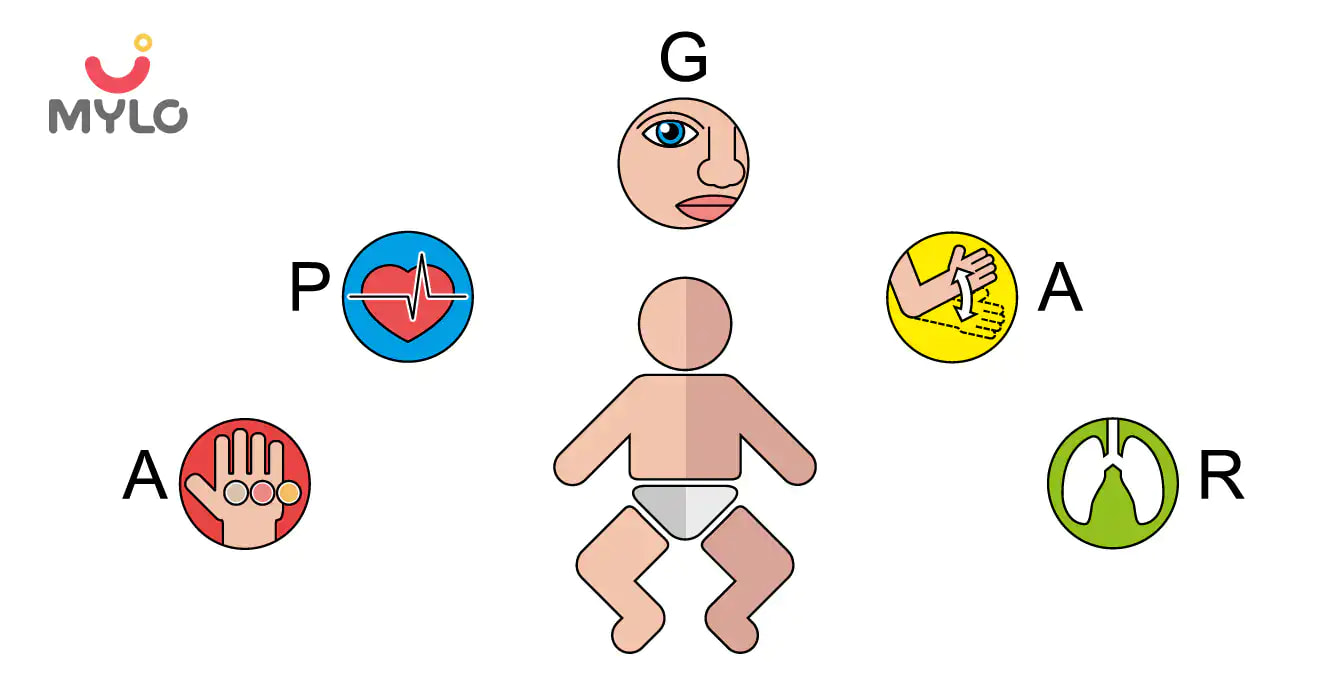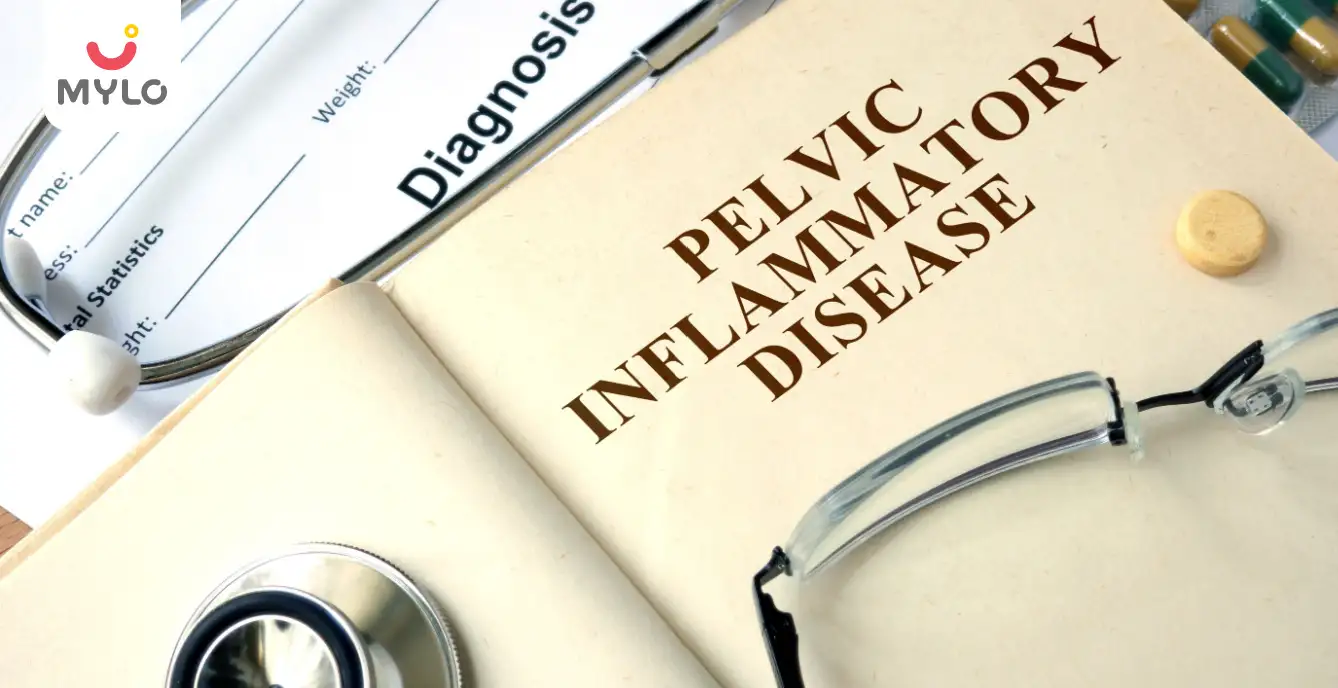Home

Growth & Development

APGAR Score: Meaning & How it is Performed
In this Article

Growth & Development
APGAR Score: Meaning & How it is Performed
Updated on 2 May 2023
Every newborn baby after birth is given an APGAR score. This is done to check the baby's overall health. This examination records the baby's heart rate, muscle tone, and other indicators to determine whether any medical care or emergency treatment is required.
It can be quite complex for parents to understand, especially how the text is done and what the scores mean. However, it's extremely useful, especially in understanding what ails the baby and how it can be treated. Read on to understand more about APGAR score and how it benefits a baby.
What is AGPAR Score?
APGAR is a simple test performed on a newborn baby. It is conducted at intervals of 1 minute and 5 minutes post-birth. The test evaluates the baby's heart rate, respiratory effort, reflex irritability and other vitals to determine the overall health of the newborn.
-
The 1-minute score checks the baby's tolerance during the birthing process.
-
The 5-minute score highlights the baby's health condition outside the mother's womb.
You may like: Fetal Growth and Development During Pregnancy
How does the test for APGAR scores work?
The Newborn APGAR score is divided into five categories. Each category is allocated a score of 0, 1 or 2, with a combined maximum score of 10. An APGAR score of 10 is very rare.
Each letter in APGAR stands for one aspect evaluated after the baby's birth.
1. A: Activity or muscle tone:
0 = limp, 1 = little flexion of extremities, 2 = active motion
2. P: Pulse or heart rate:
0 = no heartbeat, 1 = less than 100 beats per minute, 2 = more than 100 beats per minute
3. G: Grimace:
0 = no response to stimulation, 1 = sluggish response, 2 = active response
4. A: Appearance:
0 = blue or pale, 1 = pink body and blue extremities, 2 = entirely pink
5. R: Respiration or breathing:
0 = no breathing, 1 = weak crying, 2 = strong crying
The APGAR count is evaluated twice. Ideally, a baby's score is very low during the first test and improves in the latter test. If the score continues to be low after 5 minutes, the doctor will conduct the test again, after another 5 minutes.
How do I interpret my baby's score?
It is important to note that the APGAR score is not a diagnostic tool. Hence, it should not be used as the sole indicator to check the newborn's health. This is an easy-to-use tool that helps assess the physical condition of the baby, immediately after birth. A low APGAR score does not mean that the baby is sick.
It means that the baby may require immediate medical care, such as suctioning of the airways or oxygen to help him/her breathe better. Even perfectly healthy newborns might have lower-than-average scores, particularly in the first few minutes following delivery.
You may like: Baby Growth: When Do Growth Spurts Occur in Babies?
What is a normal APGAR score?
The APGAR score can range between 0 and 10. A normal APGAR score at birth is 7 or above. It shows that the baby is healthy with consistent breathing effort, adequate heart rate, active muscle tone, good pink colour and normal reflex irritability. Thereby, it does not require any immediate medical attention.
On the other hand, a score between 4 and 6 indicates that the newborn is moderately unwell while a score between 0 to 3 signals the need for emergency medical intervention.
What happens if my baby's APGAR score is low?
A low APGAR count may indicate that the baby requires immediate medical attention. For example, if the score is between 4 and 6, it may mean that the newborn is not breathing normally, has poor muscle tone, or does not respond well to stimuli.
In a situation with an even lower score (0-3), the doctor will immediately provide the newborn with emergency care in the form of oxygen therapy, stimulation, suctioning and monitoring.
Note: A low APGAR result may not necessarily indicate a serious condition. Babies with a low score at 1-minute will often have a normal score at five minutes. If the doctor identifies a potential issue, a complete check-up will be done to understand the underlying condition.
What is the importance of the APGAR score?
AGPAR is a quick assessment tool employed to check the infant's physical condition immediately after birth. The importance of the Apgar Score is determined by its ability to allow doctors to identify newborns who may be in distress and require immediate attention. In addition, the score can also be used to track the infant's progress and identify patterns in its health condition.
You may like : Congenital Heart Disease: Symptoms, Causes & Treatment
What else do I need to know?
A Neonatal Apgar Score helps healthcare providers in assessing the newborn's overall health condition immediately after birth, i.e., at the time of birth and outside the womb. This helps in taking quick action in a medical emergency and deciding if the baby requires any medical care right after birth. It is important to note that babies take time to adjust to the outside world. They generally perform well after receiving proper medical care.
However, it should be noted that the APGAR score is for newborns only. It does not help forecast a baby's behaviour, intelligence, long-term health or personality.



Written by
Roohi Kalra
Get baby's diet chart, and growth tips

Related Topics
RECENTLY PUBLISHED ARTICLES
our most recent articles

Love, Sex & Relationships
Dyspareunia (Painful Intercourse): Causes & Treatment

Infections in New Mom
Short Bowel Syndrome: Causes, Symptoms, and Treatment

Illnesses & Infections
Pelvic Inflammatory Disease (PID): Symptoms, Causes & Treatment

Labour & Delivery
Lightning Crotch in Pregnancy: All You Need to Know

Vaginal Discharge
Vaginal Dilator: Learn its Types & How To Use It?

Care for Baby
Infected Umbilical Cord: Symptoms, Treatment And Prevention
- Is Hair Fall Normal in Pregnancy
- Syphilis: Symptoms, Causes, Risks & Treatment
- Congenital Heart Disease: Symptoms, Causes & Treatment
- Fetal Echo Test in Pregnancy: A Diagnostic Tool for Detecting Heart Defects in the Womb
- Bedwetting (Nocturnal Enuresis): Causes, Symptoms & Treatment
- Birthmark: Types, Causes, Risks & Treatment
- Behaviour Therapy: Benefits, Types & Techniques
- How Long Does Breast Milk Last at Room Temperature?
- Thrush: Causes, Symptoms, Treatment, and More
- Childhood Asthma: Symptoms, Causes & Treatment
- Reflux in Baby: Symptoms, Causes & Treatment
- Pre Eclampsia: Meaning, Causes & Symptoms
- Baby Diarrhea: Causes, Symptoms & Treatment
- Bronchiolitis: Causes, Symptoms & Treatment


AWARDS AND RECOGNITION

Mylo wins Forbes D2C Disruptor award

Mylo wins The Economic Times Promising Brands 2022
AS SEEN IN

- Mylo Care: Effective and science-backed personal care and wellness solutions for a joyful you.
- Mylo Baby: Science-backed, gentle and effective personal care & hygiene range for your little one.
- Mylo Community: Trusted and empathetic community of 10mn+ parents and experts.
Product Categories
baby carrier | baby soap | baby wipes | stretch marks cream | baby cream | baby shampoo | baby massage oil | baby hair oil | stretch marks oil | baby body wash | baby powder | baby lotion | diaper rash cream | newborn diapers | teether | baby kajal | baby diapers | cloth diapers |




